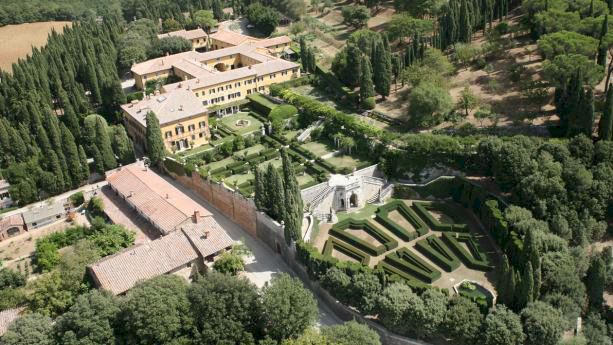Prudence inquired, "Have I done too much?" and enthusiasm or compassion, "Might I not, perhaps, have done more?
I'm reading the autobiography of Iris Origo at the moment. She was a fascinating woman, born in 1902 to an aristocratic Anglo-Irish mother, and a father from the mind-bogglingly wealthy New York Cutting family. After the death of her father from tuberculosis, she was brought up by her mother in the Florentine Villa Fiesole. She married an Italian aristocrat, Antonio Origo, and they bought a vast estate near Siena, called La Foce, which they restored with gardens designed by Cecil Pinsent.
 |
| Iris Origo: source https://www.librarything.com/author/origoiris |
During World War II, Iris and her family sheltered refugees on their estate, and she established a model farm, model school and hospital at La Foce for the tenant farmers.
 |
| La Foce: source, http://www.montepulciano.net/la_foce_iris_origo.htm#.VxVejfkrLIU |
Iris Origo was also a rather interesting historian. She wrote several biographies and works of history, and I came across her first because of an article in Speculum 1955 entitled 'The Domestic Enemy: The Eastern Slaves in Tuscany in the Fourteenth and Fifteenth Centuries'. It's a very stimulating article, amassing a good deal of archival material about late medieval slavery, and showing how owners both exploited, and were terribly afraid of, their slaves. She is perhaps most famous for her book, The Merchant of Prato, about Francesco Datini, a fourteenth-century merchant who left the most extraordinary archive of around 153 000 documents.
I'm enjoying getting to know the woman, as far as one can, through her autobiography - and learning about her extraordinarily privileged, and rich (in every sense) life. Some of her comments are very much of her time, some of them appal me slightly, and some resonate in such a way that I would just love to have met her.
In her personal diary, she wrote that the challenge of life:
'arose from a continual necessity to weigh in the balance not courage and cowardice, or right and wrong, but conflicting duties and responsibilities equally urgent.... At the end of each day prudence inquired, "Have I done too much?" and enthusiasm or compassion, "Might I not, perhaps, have done more?"'
This comment has been removed by a blog administrator.
ReplyDeleteThis comment has been removed by the author.
ReplyDelete